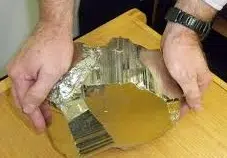The concept of lapidary comes from the Latin word lapidarius , which means “short” and which, in turn, emanates from the Latin noun “lapis, lapidis”, which can be translated as “stone”.
The first meaning mentioned by the Royal Spanish Academy ( RAE ) in its dictionary refers to what is linked to precious stones (stones that, due to their transparency, hardness and fineness, are carved for use in luxury products).
 The individual who is dedicated to carving or marketing precious stones is known as a lapidary, therefore. The lapidary works with various elements and tools to carry out the carving with precision.
The individual who is dedicated to carving or marketing precious stones is known as a lapidary, therefore. The lapidary works with various elements and tools to carry out the carving with precision.
In the same way, we cannot ignore the existence of an important historical document that responds to the name “Lapidary”. It is a treatise that addressed the magical properties of stones and the relationship they have with astrology. It is important to know that it was translated on several occasions, although the best known translation is the one that was carried out into Spanish around the year 1250 by King Alfonso X the Wise.
A total of 360 stones are the ones that play a leading role in this document, which is made up of four different books where they are related to the signs of the zodiac, with the conjunction of the planets and even with the phases of those already mentioned. signs. Likewise, what another of those books does is expose each and every one of the words arranged alphabetically.
Lapidary, on the other hand, is that related to the inscriptions on tombstones (stones with annotations, notes, epigraphs, etc.). Additionally, someone who is in charge of recording or making tombstones is called a lapidary.
Starting from this meaning, it should be noted that among the words that function as synonyms for the term addressed in this case are jeweler, chiseler, engraver, jewelry maker, carver, marble maker or silversmith, among others.
Beyond all these uses of the concept, the most frequent use of lapidary in everyday language is as an adjective to describe the expression or style that is characterized by its concision and for being definitive .
For example: "The president of the club was lapidary with the player" , "The journalist carried out a lapidary analysis of the national reality" , "The young man offered a lapidary argument to justify his actions" .
Taking this meaning into account, we can establish that among the words that can be used, therefore, as a synonym for lapidary are from concise to abbreviated, including concise, sober, brief, short or reduced, for example.
Suppose that a basketball player, at the end of a game, is interviewed by a journalist. The reporter asks him what his opinion is on the judges' performance, considering that there were several controversial rulings during the course of the match. The athlete simply responds: “They had a disastrous performance and they should never direct again.” Given this exclamation, it can be said that the basketball player was lapidary : he used few words and left no room for doubt about his opinion.
